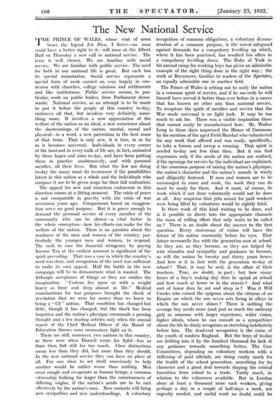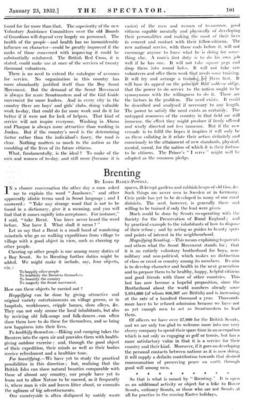The New National Service
rimiE PRINCE OF WALES, whose coat of arms -I- bears the legend Ich Dien, I Serve—no man could have a better right to it—will issue at the Albert Hall on Thursday a new call to national service. The terns is well chosen. We arc familiar with social service. We are familiar with public service. The need for both in our national life is great. But each has its special connotation. Social service represents a special form of work carried on very largely in con- nexion with churches, college missions and settlements and like institutions. Public service means, in par- ticular, work on public bodies, from Parliament down- wards. National service, as an attempt is to be made to put it before the people of this country to-day, embraces all that, but involves very definitely some- thing more. It involves a new appreciation of the welfare of the nation as an ideal, a new conscience about the shortcomings of the nation, mental, moral and physical—in a word, a new patriotism in the best sense of that term. That is only new, it is true, in so far as it becomes universal. Individuals in every corner of the land and in every walk of life are, in fact, animated by those hopes and aims to-day, and have been putting them in practice unobtrusively, and with personal sacrifice, all their lives. But what the few are doing to-day the many must do to-morrow if the possibilities latent in this nation as a whole and the individuals who compose it are to be given scope for their full realization.
The appeal for new and conscious endeavour in this direction comes at a fitting moment. The crisis of peace is not comparable in gravity with the crisis of war seventeen years ago. Comparisons based on exaggera- tion serve no good purpose. But it is grave enough to demand the personal service of every member of the community who can be shown—a vital factor in the whole conception—how his efforts can make for the welfare of the nation. There is no question about the readiness of the men and women of the country, par- ticularly the younger men and women, to respond. The rush to ease the financial stringency by paying Income Tax at the earliest moment is significant of the spirit prevailing. That was a case in which the country's need was clear, and recognition of the need was sufficient to make its own appeal. Half the battle in the new campaign will he to demonstrate what is wanted. The lethargic acceptance of things as they are ossifies the imagination. " Custom lies upon us with a weight heavy as frost and deep almost as life." Medical examinations for war purposes brought the shock of revelation that we were far nearer than we knew to being a " C3 " nation. That condition has changed but little, though it has changed, but the shock has been forgotten and the nation's physique commands a passing thought and a few leading articles only when the annual report of the Chief Medical Officer of the Board of Education throws some momentary light on it.
. There are still, moreover, two nations in this country, as there were when Disraeli wrote his Sybil—less so than then, but still far too much. Class distinctions mean less than they did, but more than they should. In the new national service they can have no place at all. For one class to set itself consciously to help another would be rather worse than nothing. Men must mingle and co-operate as human beings, a common citizenship bulking far larger than the .consciousness of differing origins, if the nation's needs are to be met effectively by the nation's sons. New contacts will bring new sympathies and new understandings. A voluntaiy recognition of common obligations, a voluntary demon- stration of a common purpose, is the surest safeguard against demands for a compulsory levelling up which, where it has been prkictised, hai resulted too often in a compulsory levelling down. The Duke of york in his annual camp for working boys has given an 'admirable example of the right thing done in the right way ; the work at Brynmawr, familiar to readers of the Spectator, an equally admirable one in another field.
The Prince of Wales is setting out to unify the nation in a common spirit of service, and if he succeeds he will himself have served it better than ever before in a career that has known no other aim than national service. To recapture the spirit of sacrifice and service that the War made universal is no light task. It may be too much to ask for. There was a visible inspiration there that cannot easily be manufactured here. Mr. Walter Long in those days impressed the House of Commons by his mention of the aged Field-Marshal who volunteered for any work that offered and was ready, specifically, to take a broom and sweep a crossing. That spirit is needed to-day not less than then. But it can find expression only if the needs of the nation are realized, if the openings for service by the individual are explained, if the conscious purpose of raising the nation's physique, the nation's character and the nation's morale is wisely and diligently fostered. If men and women are to be encouraged to come and work, the work they can do must be ready for them. And it must, of course, be work which if not done voluntarily would not be done at all. Any suspicion that jobs meant for paid workers were being filled by volunteers would be rightly fatal.
Is there work of this kind waiting to be done, and is it possible to direct into the appropriate channels the mass of willing effort that only waits to be called on ? There is no doubt about the answer to the first question. Every statesman of vision will have the future of his nation constantly before his eyes. That future necessarily lies with the generation now at school. As they are, as they become, as they are helped by wise stimulus and sympathy and guidance to become, so will the nation be twenty and thirty years hence. And how is it in fact with the generation to-day at school ? That, it may be said, is the affair of their teachers. True, no doubt, in part ; but how many hours of a boy's waking day does he spend at school and how much at home or in the streets ? And what sort of home does he eat and sleep in ? Was it Will Crooks who coined the epigram about the citizens of an Empire on which the sun never sets living in alleys in which the sun never, shines ? There is nothing the average boy needs more (and just as much the ordinary girl) as someone with larger experience, wider vision, higher ideals, whom he can consult as a sympathizer about the life he dimly recognizes as stretching indefinitely before him. The dead-end occupation is the curse of the youth of modern England. But the boy's, of to-day are drifting into it by the hundred thousand for lack of any guidance towards something better. The Care Committees, depending on voluntary workers with a stiffening of paid officials, are doing vastly much for the health of the school generation, something for its character and a great deal towards shaping the critical transition from school to a trade. Vastly much, in relation to the volunteers available. But in London alone at least a thousand more such workers, giving perhaps a day or a couple of half-days a week, are urgently needed, and useful work no doubt could, be
found for far more than that. The superiority of the new Voluntary Assistance Committees over the old Boards of Guardians will depend very largely on personnel. The health of the people—and health has no inconsiderable influence on character—could be greatly improved if the ranks of those concerned with improving it could be substantially reinforced. The British Red Cross, it is stated, could make use at once of the services of twenty thousand volunteers.
There is no need to extend the catalogue of avenues for service. No organization in this country has more abundantly justified itself than the Boy Scout. Movement. But the demand of the Scout Movement is always fOr more Scoutmasters and of the Girl Guide movement for more leaders. And in every city in the country there are boys' and girls' clubs, doing valuable work to-day, that could do far more work and do it far b4ter if it were not for lack of helpers. That kind of service will not inspire everyone. Washing in Abana and Pharpar is always more attractive than washing in Jordan. But if the country's need is the determining faetor rather than the individual's fancy, the road is clear. Nothing matters so much to the nation as the moulding of the lives of its future citizens.
Inuit, fundamentally, is the ideal ? To make of the men and women of to-day, and still more (because it is
easier) of the men and women of to-morrow, good citizens capable mentally and physically of developing their personalities and making the most of their lives in concert and contact with their fellow-citizens. The new national service, with those ends before it. will not encourage anyone to leave what he is doing for some- thing else. A man's first duty is to do his own job well if he has one. It will not take square pegs and drop them into round holes. It will not take raw volunteers and offer them work that needs sonic training.
It will try and arrange a trainii. first. It
will base its appeal on the priaiPle, noblesse that the power to do service to the nation ought to be synonymous with the willingness to do it. These are the factors in the problem. The need exists. It could be described and analysed if necessary to any length. The power to satisfy the need exists as certainly. The untapped resources of the country in that field are still immense. the-effeet they might produce if freely offered and wisely directed not less immense. But if the new crusade is to fulfil the hopes it inspires it will only be as these enlisting in it relate their action definitely and consciously to the attainment of new standards. physical. mental, moral, for the nation of which it is their fortune to be citizens. The Prince's " I serve " might well be adopted as the common pledge.





































 Previous page
Previous page